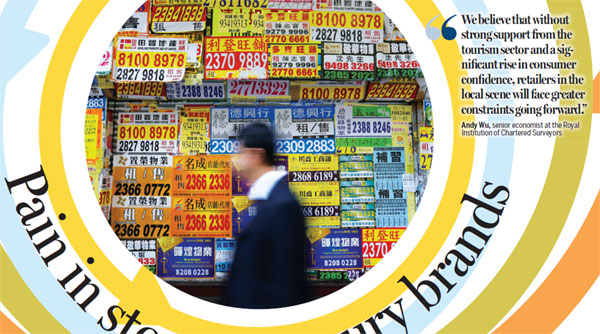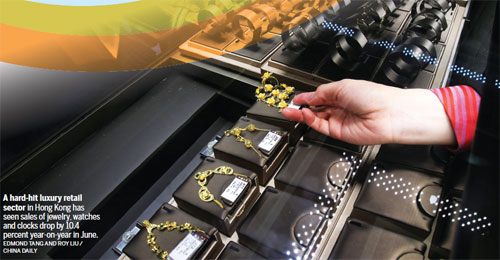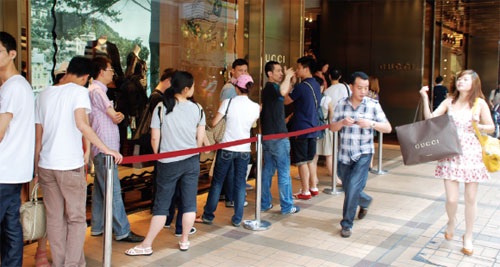Pain in store for luxury brands
Updated: 2015-08-07 08:40
By Oswald Chan(HK Edition)
|
|||||||
Mid-range retailers are stepping in as slim sales and sky-high rents see luxury brands scale back, heralding a transformation in the city's retail leasing market. Oswald Chan reports.
Luxury brands are feeling the pinch as well-heeled tourists increasingly give Hong Kong a miss and retail rents continue to soar. So much so that some are even considering shutting up shop.
Kering SA, the French owner of high-end labels including Gucci, Saint Laurent and Bottega Veneta, is demanding that Hong Kong landlords lower store rents to reflect the city's waning appeal with wealthy shoppers.
And it may even close down some stores if costs do not come down, said Jean-Marc Duplaix, chief financial officer of Kering SA, which saw Hong Kong and Macao account for more than 10 percent of first-half retail sales.
LVMH, another multinational luxury brand conglomerate and owner of coveted labels such as Louis Vuitton, Dior, Fendi and Marc Jacobs, is also becoming increasingly uneasy about the high rent level amid falling sales in Hong Kong.
Despite several rounds of negotiations with landlords, LVMH has been unable to coax any rent cuts as of now.
UK-based luxury brand Burberry seems to be in a better position as profits are still coming in. But even then, it is reviewing the number of retail outlets in Hong Kong and asking landlords to cut rents to relieve operating costs.
TAG Heuer has been less lucky, becoming the latest victim of Hong Kong's sky-high retail rents. The Swiss watch maker is closing one of its outlets on Russell Street in Causeway Bay, blaming high rents and lower revenues for a slide in profitability.
Russell Street was ranked as the most expensive street in the world in both 2012 and 2013 in terms of commercial rent, according to a study by global real estate services firm Cushman & Wakefield. But it ranked second behind New York's Upper Fifth Avenue last year as slowing retail sales had a dampening effect on rents.
Rents for retail space at street level climbed to an unsustainable high in the peak year of 2013, when rents for some retail spaces in Causeway Bay soared by 40 to 60 percent. Much of the bullish sentiment was fuelled by the expensive tastes of wealthy mainland visitors, whose numbers had soared since the launch of the Individual Visit Scheme (IVS) in 2003.
Industry watchers believe brands over-expanded their presence and are now suffering from bloated and unprofitable retail networks.
"We predict a further 15 percent decline in street-level store rents in the full year of 2015, after a full year decrease of 5.5 percent in 2014," Colliers International Hong Kong said in its second-quarter Hong Kong retail leasing market report. "Rents of street-level stores have climbed to such a high base over the past few years that they are vulnerable to a downturn." Many luxury watch and jewelry retailers are scaling back operations.
Watch retailer City Chain did not renew its lease for one of its outlets in Mong Kok, while Kowloon Watch gave up its store on Percival Street in Causeway Bay as revenue declined by an average 20 to 30 percent across all branches, Colliers International Hong Kong data showed.
"Currently, landlords of some street-level shops in Causeway Bay have had to cut rent levels by 20 to 30 percent to convince existing tenants, mainly luxury brands, to continue to lease the retail premises," Joe Lin Chi-ho, retail services executive director at CBRE Hong Kong, told China Daily.
"In the four prime shopping districts of Hong Kong -Mong Kok, Central, Tsim Sha Tsui and Causeway Bay - more street-level stores are increasingly being left vacant as tenants ask for early termination of leasing contracts. That has seen mid-range retailers snap up more street-level shops once occupied by luxury brands in these four areas, and paying 20 percent less rent," Lin added.
Street skirmishes
"Rent for street-level shops in the four prime shopping districts will fall 15 percent this year and another 10 percent in 2016," he forecast. "The magnitude of decrease will lessen next year as the comparison base has already been lowered this year."
Michele Woo Wing-sze, executive director and head of retail at Cushman & Wakefield, said: "We are not surprised to see street-level shop rents in Hong Kong's prime shopping districts fall 30 to 50 percent this year given that it had skyrocketed in recent years."
An intricate combination of factors are being held up as responsible for dwindling retail sales in Hong Kong and their knock-on effect on shop rents in prime shopping districts.
On April 13, the central government announced a cap on visits by Shenzhen permanent residents to Hong Kong, from "one-year multiple entry" to "once per week". This has drastically cut the number of mainland visitor arrivals in Hong Kong through the IVS.
Moreover, the anti-corruption campaign on the mainland and the shifting shopping pattern of mainland visitors, away from luxury goods and toward mass market products, is also crimping luxury product sales as conspicuous consumption loses its allure.
The strength of the Hong Kong dollar, thanks to the Linked Exchange Rate System, against other major currencies, especially the Japanese yen, has also made other global shopping destinations more attractive to mainland tourists.
But as luxury brands scale down their operations, other retailers have been stepping in to fill up the market vacuum.
US technology giant Apple Inc in July opened its fourth retail outlet in Hong Kong, located on 100 Canton Road and covering three floors. Hundreds of "i-fans" gathered in Tsim Sha Tsui, some even camping overnight, as the store was unveiled on July 30.
Also in Tsim Sha Tsui, Taiwan bookstore Eslite leased 50,000 square feet in Star House for their second retail outlet in the city, after their three-story, 41,000 sq ft flagship store at Hysan Place in Causeway Bay.
Mid-range jewelry retailers are leasing some spaces recently made vacant by watch makers and luxury jewelers.
Folli Follie has leased a 1,100 sq ft store on Queen's Road Central previously leased to Carlson Watch, while Pandora has taken up a space earlier occupied by Royale Time on D'Aguilar Street for a similar rent, according to US-based commercial real estate giant CBRE.
Cosmetics retailer Lush will open a new 6,900 sq ft flagship store at Lyndhurst Terrace in Central later this year, according to JLL Hong Kong.
"As rents decline, some of the most expensive shopping streets in Hong Kong will see a gradual change in the tenant mix, creating what we hope will be a more sustainable retail landscape," said Tom Gaffney, head of retail at JLL Hong Kong. "More local retailers, fast fashion and lifestyle store operators will likely take advantage of the opportunities to secure shops in prime shopping locations. International retailers, however, will remain keen on Hong Kong given its mature retail market."
"We expect high street shop rents to drop by 15 to 20 percent this year while rent for prime shopping centers will grow up to 3 percent because retailers still show a strong preference toward shopping centers," Gaffney added.
Woo from Cushman & Wakefield agreed that the recent market correction will make the local retail landscape more sustainable and diversified.
"When luxury brands retreat from prime shopping districts, localized retail brands and specialty restaurants can capitalize on this opportunity to expand their footprint in these areas."
CBRE's Lin is confident that this will be a golden opportunity for mid-level retailers to expand their business footprint in the four prime shopping districts in town.
"Rents in shopping malls will stay resilient due to the variety in their tenant mix (as in they are not heavily exposed to luxury brands) and relatively high occupancy rates. Shopping mall rents will experience moderate single-digit growth this year," Colliers International Hong Kong noted in its report.
Looking ahead, the city's retail leasing market is expected to continue its structural transformation in the next few years.
"The retail property market is currently facing a multitude of tough challenges including a decline in mainland tourist flows and household caution, which will continue to weigh on retail spending and expectations for retail property," noted Andy Wu, senior economist at the Royal Institution of Chartered Surveyors.
"We believe that without strong support from the tourism sector and a significant rise in consumer confidence, retailers in the local scene will face greater constraints going forward," Wu cautioned.
In May this year, private retail rental was up 2.53 percent from December 2014, according to Rating and Valuation Department figures. The growth rate for retail rental peaked in 2012 when it rose by nearly 13 percent, before slowing down to 6.89 percent in 2013 and 5.02 percent in 2014.
Contact the writer at oswald@chinadailyhk.com


|
The going may look good for brands such as Gucci, if this contented shopper and the scores queuing for entry are anything to go by, but owner Kering SA is thinking of downing a few shutters. Provided to China Daily |
(HK Edition 08/07/2015 page9)
